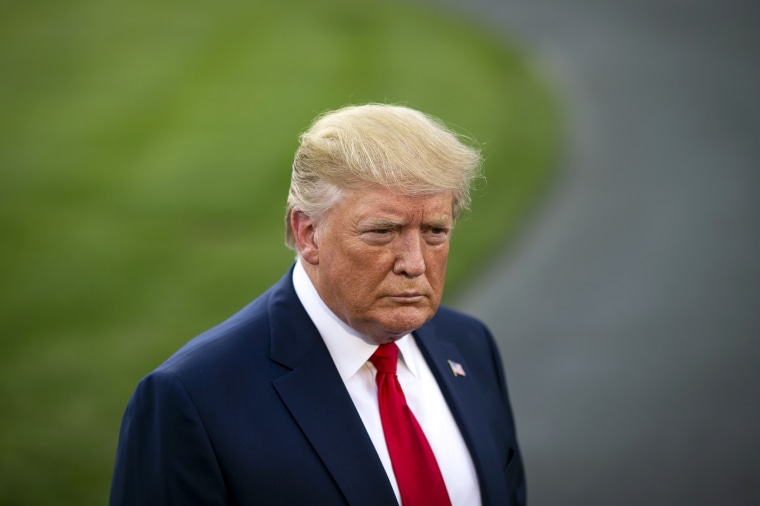WASHINGTON — President Donald Trump now has three GOP primary challengers, but they won't be given a chance to compete in at least four states after Republicans there decided to scrap their presidential nominating contests in favor of supporting Trump.
The Republican parties of Nevada and South Carolina, both crucial early nominating states, voted this weekend not to hold contests, as did Kansas and Arizona.
"With no legitimate primary challenger and President Trump's record of results, the decision was made to save South Carolina taxpayers over $1.2 million and forgo an unnecessary primary," South Carolina GOP Chairman Drew McKissick said in a statement. "President Trump and his administration have delivered for South Carolinians, and we look forward to ensuring that Republican candidates up and down the ballot are elected in 2020."
South Carolina's move is an attempt to sideline the state’s former Republican governor, Mark Sanford, who on Sunday declared his intention to challenge the president in the GOP primary. Also in the running against Trump are former Illinois Rep. Joe Walsh and former Massachusetts Gov. Bill Weld.
Trump was asked Monday if he would debate any of his Republican rivals.
"I don't know them," the president responded. "I would say this: They are all at less than 1 percent. I guess it's a publicity stunt. We just got a little while ago (a poll showing) 94 percent popularity or approval within the Republican party. So to be honest, I'm not looking to get them any credibility. They have no credibility."
He added, "One was a person that voted for Obama, ran as a vice president four years ago and was soundly defeated, another one got thrown out after one term in Congress and he lost in a landslide and the third one — Mr. Appalachian trail — he wasn't on the Appalachian trial; he was in Argentina."
Sanford, a conservative who clashed with Trump when he served in Congress, said on MSNBC on Monday that he's running because Republicans have turned their back on their values in favor of personal allegiance to Trump.
"Right now, the sun, moon and stars too often basically orbit around Donald Trump,” Sanford said of the attitude of the GOP. "And if it's not personal allegiance to him, not issue allegiance or idea allegiance, but if it's not personal allegiance, it's not good enough."
Sanford said he would consider legal or other challenges to South Carolina GOP's action, but acknowledged his entire campaign is an uphill battle against the incumbent.
Trump fired back at Sanford by bringing up his much-publicized infidelity scandal and knocked "The Three Stooges" running against him as a "all badly failed candidates."
Republicans pushed back on the idea that there was anything unusual about the state parties' decisions to scrap primaries and caucuses, noting that both parties have made similar moves when they have incumbent presidents up for re-election.
"These are decisions made entirely by state parties, and there are volumes of historical precedents to support them," said Trump campaign communications director Tim Murtaugh. "Nevertheless, President Trump will dominate and prevail in whatever contest is placed before him."
But in most recent cases that the Trump campaign cited, such as Barack Obama's re-election in 2012, there was no declared primary challenger to the incumbent. In contrast, Trump now has three rivals who have served in the top-levels of elective office.
In Nevada, the state’s GOP at a convention Saturday also decided to forgo their caucus, which typically comes right after Iowa and New Hampshire in the nominating calendar.
"It would be malpractice on my part to waste money on a caucus to come to the inevitable conclusion that President Trump will be getting all our delegates in Charlotte," Nevada Republican Party Chairman Michael McDonald said in a statement, referring to the city where the Republican National Convention will be held next year.
Kansas' GOP also came to the same decision on Friday.
"The Kansas Republican Party will not organize a Caucus for the 2020 election because President Donald Trump is an elected incumbent from the Republican Party," the party announced on Twitter.
The state party estimated it would cost $250,000 to hold the presidential caucus and said the money could be better spent on contesting tough races.
Arizona Republican Party Chairman Kelli Ward made a similar argument after his party also voted this weekend to nix their primary.
"This is nothing new, despite the media's inauthentic attempt to portray it as such," Ward said, referring to other times parties with incumbent presidents have forgone primaries. "Arizona Republicans are fired up to re-elect President Trump to a second term and will continue to work together to keep America — and Arizona — great.”
More states could follow as they set their presidential nominating plans for the future.
But Iowa and New Hampshire, the two most important states in the nominating process, are planning to go ahead with their contests.
Iowa GOP Chairman Jeff Kaufmann told Radio Iowa that state party leaders have "never considered" canceling their famed caucus.
New Hampshire's first-in-the-nation primary, meanwhile, is governed by state law, not the parties, so "there wouldn’t an option for New Hampshire to cancel," Joe Sweeney, the communications director for the state party told NBC News.

